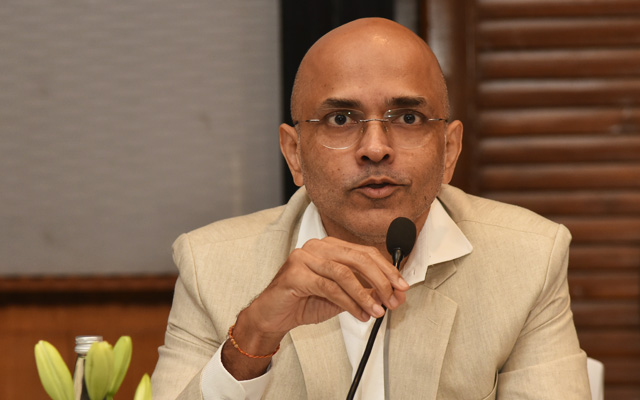Pradeep Shetty, president of the Federation of Hotel & Restaurant Associations of India (FHRAI), shares how the association functions as a vital intermediary between the hospitality industry and its stakeholders, and how committed it is to driving the sector's growth and contributing to India's economic aspirations

Can you please share a background of FHRAI, its membership, and the association’s focus areas?
FHRAI is the apex body representing the Indian hospitality industry, encompassing 60,000 hotels and 500,000 restaurants across the nation. Established in 1955, FHRAI bridges the gap between the hospitality industry and key stakeholders, including government bodies, industry associations (both domestic and international), consumer groups, and academia. Through policy advocacy, education, research, and interactive engagements, FHRAI strives to advance and develop the hospitality sector.
Founded by four regional associations – Hotel & Restaurant Association of Eastern India, Hotel & Restaurant Association of Northern India, South India Hotels & Restaurants Association, and Hotel And Restaurant Association (Western India) – FHRAI currently has around 3,500 direct members, with 68 per cent from the hotel segment and 31 per cent from restaurants.
FHRAI also operates the FHRAI Institute of Hospitality Management (FHRAI – IHM) in Greater Noida, Uttar Pradesh, offering a Bachelor’s in Hospitality & Hotel Administration, accredited by the National Council of Hotel Management Catering Technology Noida under the Ministry of Tourism, Government of India, and Jawaharlal Nehru University in New Delhi.
As the association’s president, what are your priorities?
My top priorities revolve around advocating for regulatory frameworks, infrastructure status, and digital competition laws to propel the hospitality sector forward.
We are actively urging the government to grant infrastructure status, providing access to long-term funding. This effort aligns with our push for industry status and constitutional inclusion to elevate tourism to a national priority.
We are also addressing challenges posed by Online Travel Aggregators (OTAs) and Food Service Aggregators, advocating for ex-ante regulation and fair competition. Additionally, we seek stimulus packages and incentives, including favourable GST regimes and streamlined measures to enhance the ease of doing business and foster industry growth.
Key issues demanding urgent attention include resolving pending legal matters, such as music copyright issues with certain agencies, and ensuring fair competition between OTAs and hotels. We advocate for a level playing field and collaboration between digital platforms and the industry.
FHRAI recently joined the Sustainable Tourism Alliance. How do you envision your member hotels and the broader hospitality industry in India adapting to sustainable tourism practices?
FHRAI’s collaboration with the Sustainable Hospitality Alliance signifies a major step towards sustainability in India’s hospitality industry. This partnership emphasises FHRAI’s commitment to advancing sustainable tourism practices and achieving net-positive hospitality, where the industry gives back more than it consumes.
With the Sustainable Hospitality Alliance representing over 50,000 hotels and seven million rooms worldwide, FHRAI aims to champion innovation and climate action within the Indian hospitality sector. Through joint projects and knowledge-sharing initiatives, FHRAI and the Alliance will promote best practices, leveraging FHRAI’s role as India’s apex industry association to foster dialogue and thought leadership in the tourism and hospitality domain.
As the hospitality industry in India continues to recover post-pandemic, how do you see FHRAI’s role evolving?
As the industry rebounds from the pandemic, FHRAI remains committed to promoting growth and advancing collective interests. Through active policy engagement and advocacy, FHRAI continues to guide the industry through changing circumstances and new challenges.
Post-pandemic, FHRAI has provided crucial guidance on travel and hospitality protocols, aiding recovery and adaptation. The association’s focus on technology adoption, such as contactless check-ins and digital menus, reflects the industry’s shift towards tech-driven solutions to enhance guest experiences.
FHRAI emphasises retraining and upskilling the workforce to align with new operational norms, exemplified by initiatives like the Food Safety Training & Certification programmme. The association also promotes sustainability and environmentally friendly practices to encourage green investments and tourism, supporting the prime minister’s vision of a three-trillion-dollar economy and welcoming 100 million tourists by 2047.
The lack of skilled human resources is one of the challenges of the Indian hospitality sector. How is FHRAI working to bridge this gap?
FHRAI is addressing this challenge through multiple initiatives. Recognising the growing disinterest among the younger generation in hospitality careers, we highlight the industry’s rewarding aspects, such as creativity, international exposure, and meaningful guest interactions.
We advocate for work-life balance, attractive incentives, and robust training and development programmes to attract and retain talent. Collaboration among stakeholders – academia, government, industry, and students – is crucial in implementing strategies to showcase the value of hospitality careers to the new generation. FHRAI proposes joint consultations to address critical issues impacting hospitality education and devise long-term strategies and action plans.
What will be your advice to youngsters looking to join the hospitality industry?
My advice to youngsters is to recognise the vast opportunities and potential for growth in this dynamic sector. I encourage their active participation in shaping the industry’s future.
India’s growing population and increased disposable income offer abundant travel, tourism, and hospitality opportunities. Millennials are driving demand for unique experiences, creating numerous prospects within the sector.
FHRAI is committed to nurturing young talent, and providing a platform for innovative ideas. The career growth path in the industry today offers immense opportunities for deserving and qualified youngsters.













